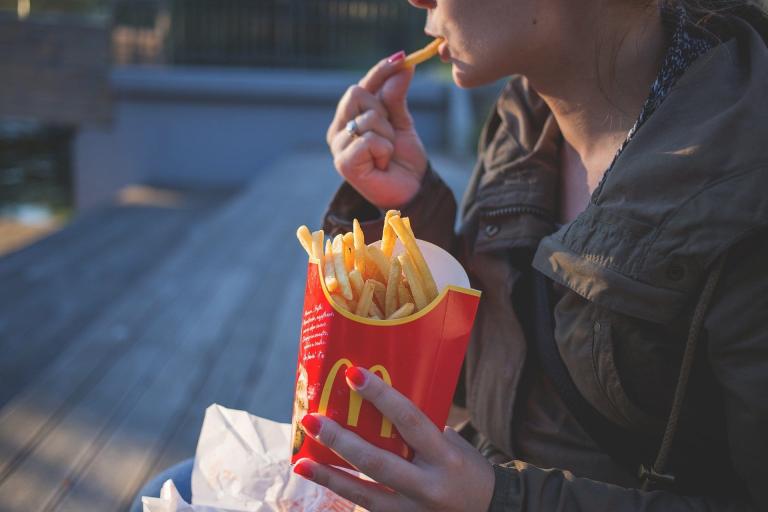You know the drill. You reach for that second piece of pie. It tastes so good but you aren’t really hungry. After a few bites you think, “Why did I just eat that? I wasn’t hungry! I need to stop eating!” Honestly, there are lots of reasons why we eat when we aren’t hungry. Here are a few of them and how to fix the problem:
1. Food is just there! It’s staring you down, begging you to indulge. The sight of inviting foods is enough to prompt the Pavlovian response to eat.
The Fix: When it comes to food, out of sight, out of mind is good! Also, tell yourself, you can eat it but you don’t want to. This type of thought doesn’t make you feel deprived (which prompts you to eat), rather it puts you in charge. Finally, if you still struggle, drink water and fill yourself up. Wait 15 minutes and see if the urge to eat passes. When you feel full, you can resist food better, especially when it is right in front of you.
2. Stress: No surprise here. Stress influences eating more than we think. When stress is chronic, your body releases the hormone cortisol. When cortisol levels stay high, you keep reaching for the snacks. And those desired snacks are usually high fat, comfort foods.
The Fix: There is no easy way around this but to de-stress your life. Since eating is often a response to stress, controlling stress and finding ways to relax without food is key. Learn stress management techniques. And/or figure out ways to lessen stress in your life.
3. Feeling tired. Fatigue makes you want to eat. When you don’t sleep, the hormone ghrelin rises. The rise in that hormone makes you hungry. Consequently, you will feel hungry even when you are not. Thus, lack of sleep sets you up to overeat.
The Fix: The fix is to get a good night’s rest. Seven to nine hours a night helps fight overeating. Both sleep and exercise work against overeating. It’s one of the best prescriptions for weight loss you will ever get. Get sleep, lose weight!
4. Feeling anxious. When you feel anxious, food can be used to cope. It’s available, tasty and takes your mind off of worry-at least for a few moments while you experience pleasure from the food. Eating when anxious can lead to binge eating over time and a habit of medicating anxiety with food.
The Fix: Of course, the best fix is to get at the source of your anxiety and treat it. You can also substitute another behavior like exercise, mindfulness or distraction. A distracted brain will calm down anxious feelings. When anxious, turn your attention to a mental exercise like counting to 10 backwards, thinking of cities that begin with the letter A, etc. This type of mental distraction will engage the thinking part of your brain and calm down the anxious feeling part.
5. Being with other people. Let’s say you were doing very well on your eating plan. But then the weekend comes. Friends go out to eat and start ordering a lot of food. It’s a social and fun time. You find yourself overindulging just because everyone else is doing the same. And you really aren’t that hungry, but the appetizer plate is right in front of you. So you pick a little here and there and don’t pay attention to hunger. You are mindlessly eating with friends. And when you add alcohol to the outing, eating can really increase.
The fix: Sometimes the easiest way to solve this problem is to simple be aware of how much you are eating. Eat slowly and pick at the appetizer. Move the food away from your direct reach. Watch your alcohol intake. And be mindful. When you don’t attend to what you are doing, eating is an automatic response. Break the automation by being intentional with your strategies to limit intake. Focus on the people, not the food.
6. Pictures of food. Seeing food makes you want to eat it. For example, you are watching TV. An advertisement comes on for ice cream. It looks good so you migrate to the freezer. Or you are sitting at the gate at the airport. Your waiting area is across from an eating place with lots of food pictures. Looking at those pictures prompts you to get up and order something. Pictures of food can prompt you to eat even when you aren’t hungry. See it and then eat it!
The Fix: Keep snacks and desserts out of sight. Wrap them in foil so you don’t see them. Move away from visuals and change channels when food commercials pop up. Keep your eyes off the pictures!
7. Boredom: Dinner is over. There is nothing to do. It’s too hot outside so you turn on the TV. To help with the boredom, you grab a bag of popcorn, then a soda. Hey, wait, there are some chips in the cupboard. Do you ever notice that when you aren’t bored, you think less about food? Eating can be something to do to pass the time.
The Fix: Avoid sugary, high fat foods. Very few people (if any) binge on carrots or hummus. Go for low calorie snacks if you are bored and want to eat. However, a better strategy is to get active. Do something-paint, walk, garden, read, etc. Get up and engage in something physical to take your mind off of food.



